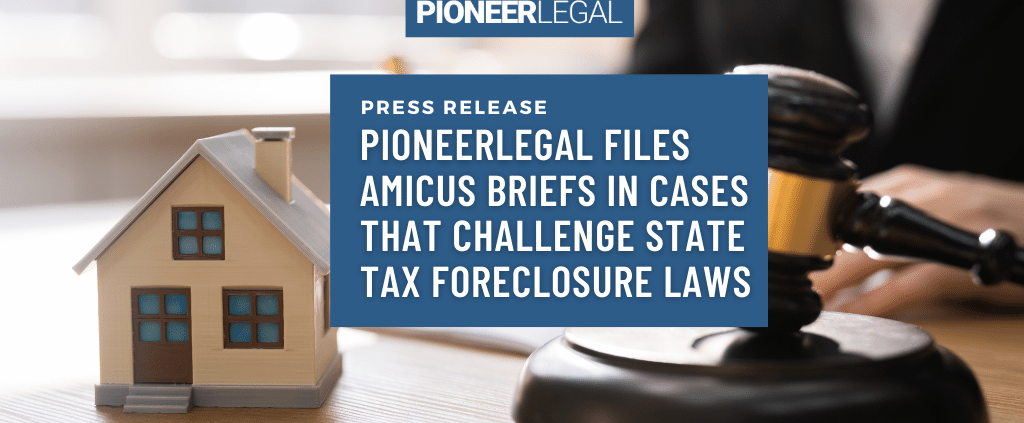PioneerLegal Files Amicus Briefs in Cases That Challenge State Tax Foreclosure Laws
Urges Supreme Court to hear cases that allow state, private actors, to realize windfall at expense of property owners
BOSTON – PioneerLegal, LLC has filed amicus briefs urging the U.S. Supreme Court to hear two related cases that test the constitutionality of Nebraska and Minnesota laws that permit the state, or a private debt collector as assignee, to take a private home, sell it, and keep the entire proceeds, even if the property sells for much more than the taxes, interest, and costs of collection due for unpaid taxes.
“We’re interested in this question because municipalities in Massachusetts have the very same right to deprive a homeowner of his or her equity in property sold at a tax foreclosure,” said PioneerLegal President Frank Bailey. Bailey added that “these cases most often fall on low income, elderly, and medically challenged homeowners.”
In Kevin Fair v. Continental Resources, the plaintiff lost his home after quitting his job to care for his wife, who had been diagnosed with multiple sclerosis. Kevin lost the home that was a wedding gift from his late mother.
Scotts Bluff, the Nebraska county in which the Fairs lived sold a tax lien for the Fairs’ unpaid 2014 taxes to a private investor, Continental Resources, for the amount owed — $588.
Continental quietly paid the Fairs’ 2015 and 2016 taxes, all the while tacking a 14 percent interest rate onto the growing tax debt. Because the county was getting the money it was owed, it stopped sending tax bills to the Fairs and gave them no warning that they were in danger of losing their home.
In April 2018, Continental notified the Fairs that it intended to apply for a tax deed, which would give the company full ownership of the home and leave the Fairs with nothing. The only way to keep their home, said the investor, was to pay $5,268—the total value of unpaid taxes, fees, and interest—within three months’ time.
The Fairs applied for loans to redeem their property, but no lender approved them. The county issued a deed to the investor for the home—including the Fairs’ equity in it—worth around $60,000. The Nebraska law at issue allows private tax collectors to keep such windfalls at the expense of property owners.
In most states, property is sold, the debts are paid, and the remaining proceeds are returned to the former owner. But Nebraska claims that it can ignore the value of the homes it seizes when collecting property tax debts. Scotts Bluff took the Fairs’ $60,000 home as payment for $5,200.
“Scotts Bluff County owes Kevin Fair just compensation for the additional $55,000 in home equity,” Bailey added. “That’s far more than the $5,268 tax debt.”
The Fairs lost their case at the state trial court. In March 2022, the Nebraska Supreme Court denied their due process, takings, and excessive fines claims. More importantly, Kevin’s wife Terry lost her battle with MS that month.
In the second case, Tyler v. Hennepin County (Minnesota), Geraldine Tyler, a 92-year old widow, lost her home to foreclosure when she could no longer afford the property taxes. When the taxes mounted to $15,000 the county seized her home and sold it for $40,000. Rather than paying itself the taxes and fees due and refunding the $25,000 to Ms. Tyler, the county kept the full sale proceeds, thus wiping out the equity that Ms. Tyler had accumulated in her lifetime.
Minnesota law permitted this outcome. From 2014 to 2020, some 1,200 Minnesotans lost their homes and all their equity for tax debts that averaged 8 percent of the home’s value. When Ms. Tyler challenged the law in federal court, the judge dismissed her case saying the state law was constitutional. After the federal Court of Appeals affirmed, Ms. Tyler sought certiorari in the Supreme Court.
PioneerLegal’s amicus brief urges the Court to hear the cases. It points out that the states’ conduct upends standard commercial law principles that provide for the debtor to enjoy a return of the equity after the state is fully paid, argues that the Nebraska and Minnesota statutes violate the rights of other creditors by allowing the state a windfall while other creditors may get nothing, and that Nebraska and Minnesota tax law runs counter to state and federal law that requires a debtor, such as Mr. Fair and Ms. Tyler, to receive “reasonably equivalent value” upon transfer of property, including in a foreclosure.
The PioneerLegal amicus brief was prepared by Morgan, Lewis & Bockius attorneys Julia Frost-Davies, Stephanie Schuster, Matthew C. Ziegler, and Matthew K. Stiles, together with the assistance of PioneerLegal attorneys Frank J. Bailey and John C. LaLiberte. PioneerLegal thanks Morgan Lewis for preparing a brief that adds a strong commercial law basis in support of certiorari.
Get Involved:




